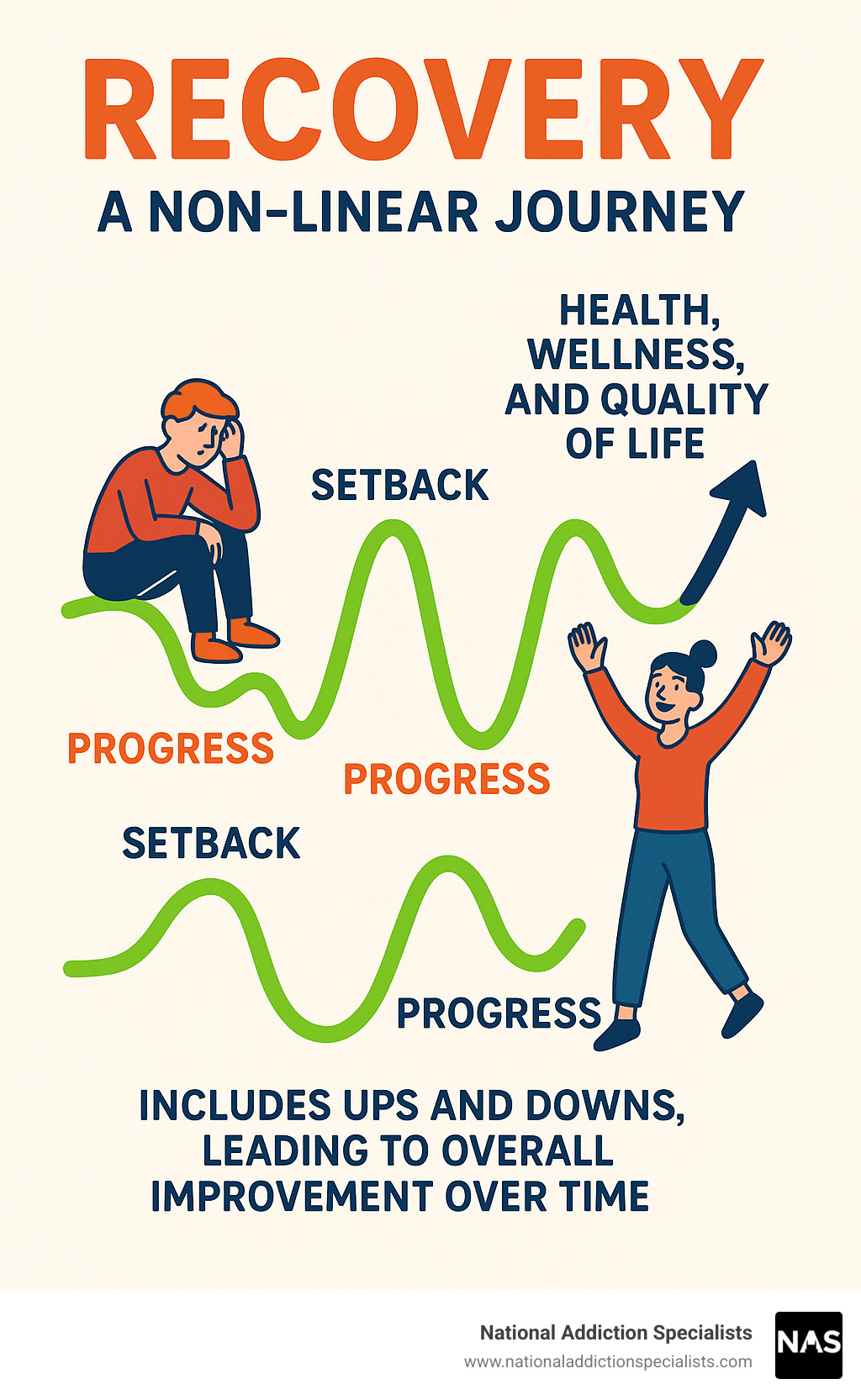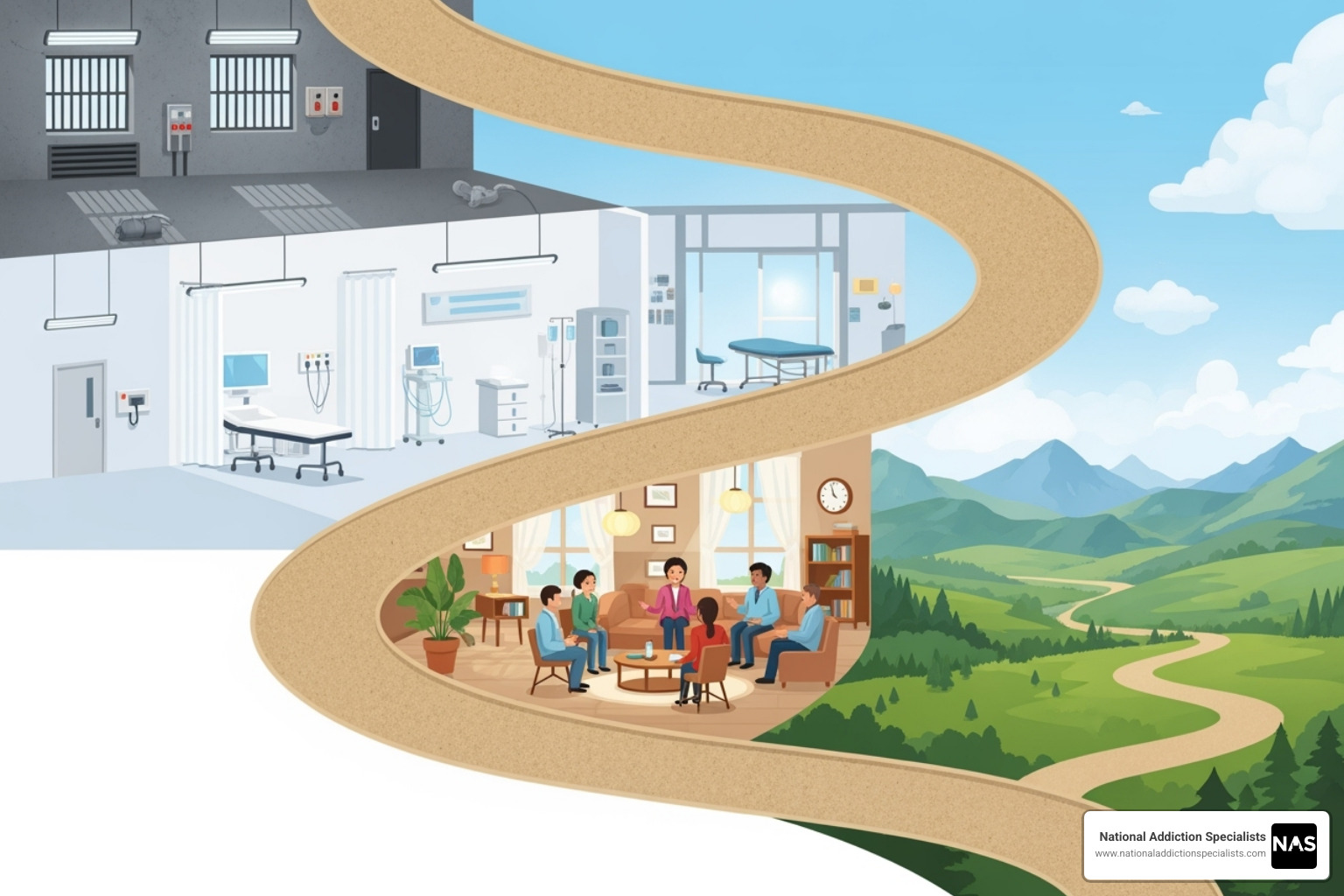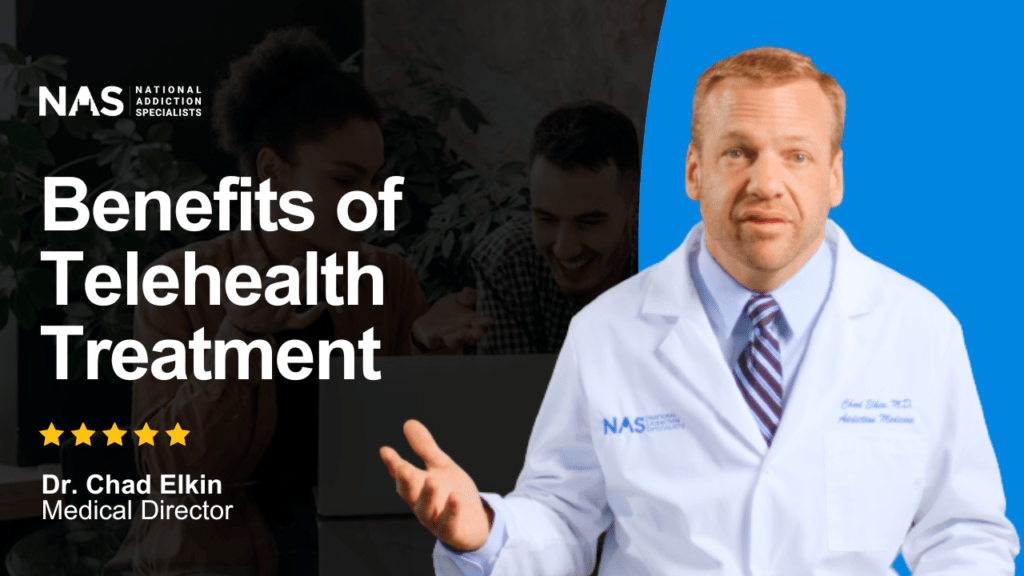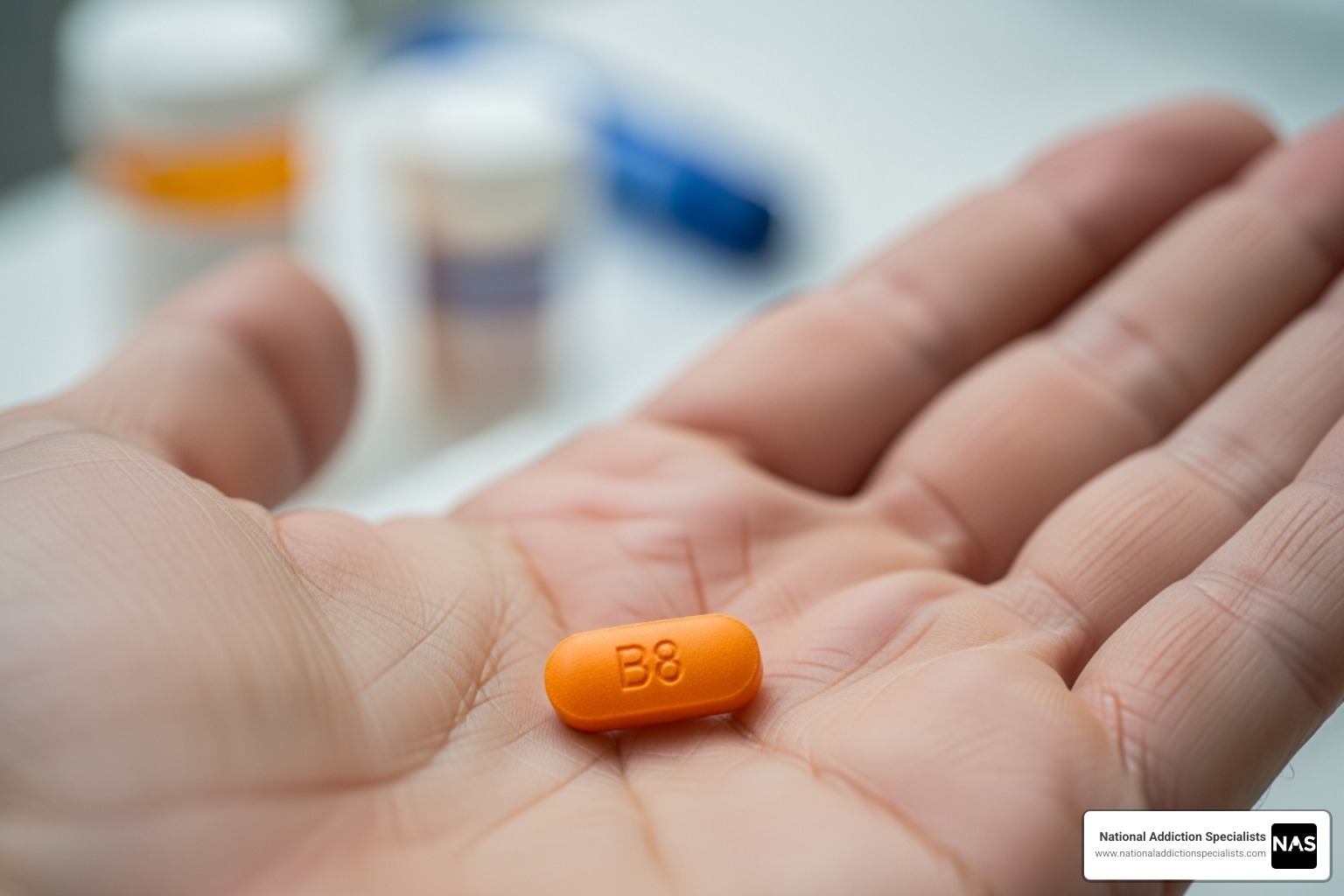Why Recovery Matters for Your Journey Forward
Recovery is a process of change through which you can improve your health, wellness, and quality of life while striving to reach your full potential. It’s not about being “cured” but about creating a meaningful life while managing ongoing challenges.
Key principles of recovery include:
- Self-Directed: You are in control of your path.
- Person-Centered: Your unique needs and strengths are the focus.
- Holistic: It addresses your mind, body, and spirit.
- Non-Linear: The path has ups and downs.
- Hope-Focused: It builds on possibility and personal growth.
Whether you’re dealing with a substance use disorder, a mental health condition, or both, recovery empowers you to live on your own terms. The concept is now central to improving mental health systems worldwide, recognizing that each person’s journey is unique.
I’m Chad Elkin, a board-certified addiction medicine physician and founder of National Addiction Specialists. I’ve dedicated my career to helping individuals with evidence-based, compassionate care. My experience has shown me that recovery is not only possible but can lead to a life more fulfilling than you ever imagined.

Recovery terms simplified:
Understanding the Meaning of Recovery
When you’re struggling with addiction or mental health challenges, the word “recovery” might feel both hopeful and overwhelming. It’s a profound and personal journey, not just a return to a previous state.
Defining Recovery in Health and Wellness
Recovery isn’t just about stopping drug use; it’s about building a life worth living. The Substance Abuse and Mental Health Services Administration (SAMHSA) defines recovery as “a process of change through which individuals improve their health and wellness, live self-directed lives, and strive to reach their full potential.” This definition emphasizes that recovery can happen even while managing ongoing challenges, such as using medication-assisted treatment like Suboxone.
At National Addiction Specialists, our telemedicine approach recognizes that recovery looks different for everyone. It’s about finding your path to a meaningful life by making changes that help you reach your personal goals. You can learn more by exploring SAMHSA’s working definition of recovery.
The Evolution of the Recovery Concept
The way we think about recovery has changed dramatically. In the past, treatment focused on acute care, and setbacks were often seen as failures. Thanks to people with lived experience, the focus has shifted. We now see recovery as a continuous journey, not a fixed destination.
Today’s approach is person-centered, meaning your unique needs, strengths, and goals drive your treatment plan. This evolution acknowledges that effective recovery support requires creating care environments that foster hope and respect your autonomy.

Broader Definitions of ‘Recovery’
While we focus on mental health and addiction, the word recovery appears in many areas of life, from economics to law. As noted by Merriam-Webster unabridged, these meanings all share a core idea: resilience, renewal, and moving forward after a setback. This universal concept shows why recovery resonates so deeply. It’s not about returning to who you were—it’s about finding who you can become.
The Core Principles of a Successful Recovery Journey
Your recovery journey is unique, but it’s guided by time-tested principles that act as a compass toward hope and healing. Think of these as your recovery toolkit, creating a framework for lasting change.
Guiding Principles of Recovery-Oriented Care
At National Addiction Specialists, we see these principles as the building blocks of genuine change. Effective recovery is built on:
- Hope: The belief that you can overcome challenges and find meaning again.
- Dignity: Recognizing that you matter and your past does not define your worth.
- Self-determination: You are in the driver’s seat, making choices that reflect your goals.
- Responsibility: Owning your healing journey and actively participating in your care.
- Holistic Approach: Healing the whole person—mental, physical, and spiritual well-being.
- Non-linear Path: Understanding that setbacks are part of the process, not failures.
- Strengths-based Focus: Building on what you do well to create resources for your recovery.
- Peer Support: Connecting with others who have walked a similar path and can offer unique understanding.
- Respect: Gaining respect from others and, just as importantly, developing self-respect.
- Empowerment: Being an active partner in planning and directing your care.
These principles, detailed in resources like The 10 Principles of Recovery, guide our work. For practical tips, see our guide on addiction recovery strategies.
The Vital Role of Peer Support
Peer support is irreplaceable. People with lived experience offer a unique perspective because they’ve walked the path you’re on. They can reduce feelings of isolation, provide practical guidance, and offer living proof that recovery is possible. Connecting with peers shatters the illusion that you’re alone, placing you in a community that understands without judgment.

Holistic Approaches to Support Your Recovery
Recovery is about building a life you don’t want to escape from. That’s why we treat the whole person, not just the addiction.
- Nutrition: A balanced diet can stabilize brain chemistry and improve mood. Learn more in our article on The Importance of Nutrition in Addiction Recovery.
- Exercise: Physical activity is a powerful, natural mood booster that reduces stress. Even a daily walk makes a difference. See our guide on Exercise and Alcohol Addiction Recovery.
- Meditation: Mindfulness helps you observe thoughts and feelings without reacting, a crucial skill for managing cravings.
- Nature: Connecting with the outdoors can reduce stress and provide perspective. Explore this in our article on The Power of Nature in Overcoming Addiction.
These approaches complement medical treatment, strengthening your foundation for lasting change.
Navigating Support Systems and Treatment Options
Starting your recovery journey can feel like standing at the bottom of a mountain. The good news is you don’t have to climb alone. A strong support system is crucial, and many resources are available to help you find the right path.
Finding Immediate Support: Helplines and Crisis Lines
Sometimes, you need help right now. 24/7 confidential helplines are your lifeline, providing immediate support, information, and referrals without judgment.
In the United States, the 988 Suicide & Crisis Lifeline is available anytime. Just call or text 988 to connect with trained crisis counselors. It’s free, confidential, and available 24/7.
If it’s an emergency, always call 911 or go to your local emergency department. For non-emergency moments when you need to talk, these helplines are a safe place to start.
Expert Telemedicine Recovery and Structured Support
While crisis lines offer immediate help, long-term recovery requires sustained, expert support. At National Addiction Specialists, we provide telemedicine-based treatment, allowing you to receive care from board-certified addiction medicine physicians from the privacy of your home.
Our approach focuses on medication-assisted treatment (MAT) for opioid addiction, like Suboxone, combined with counseling. We create personalized recovery plans that address the whole person, focusing on skill-building and lifestyle changes. This holistic programming helps you build a strong foundation for recovery by treating not just the addiction, but the person behind it.
We serve individuals throughout Tennessee and Virginia, making quality addiction treatment more accessible. Learn more in our guide to At-Home Addiction Recovery.
Make an Appointment to Treat Addiction
Please don’t hesitate. Make an appointment today.
Self-Management and Recovery Tools
Recovery is also about developing your own internal toolkit. Self-management strategies put you in the driver’s seat, focusing on self-empowerment and self-reliance. An effective framework for this is built around four key areas:
- Building and Maintaining Motivation: Understanding your “why” to keep your motivation strong.
- Coping with Urges: Developing practical techniques to manage cravings.
- Managing Thoughts, Feelings, and Behaviors: Learning to change unhelpful patterns that can trigger substance use.
- Living a Balanced Life: Creating a fulfilling life with healthy activities and relationships.
By focusing on these self-management principles, you build resilience and gain greater control over your recovery and your life.
Recovery in Culture: The Story of Eminem’s Album
Art often captures life’s deepest struggles and triumphs. When Eminem released his album ‘Recovery’ in 2010, he created a raw, honest portrait of what recovery looks like in real life, complete with its messy complexity and ultimate hope.
Themes of Struggle and Triumph in ‘Recovery’
The album was deeply personal, addressing Eminem’s struggles with prescription drug addiction head-on. He was refreshingly honest about his past, and ‘Recovery’ represented his commitment to sobriety and positive change.
Songs like “Not Afraid” became powerful anthems of resilience, reflecting a determination to break free from destructive patterns. “Love the Way You Lie,” featuring Rihanna, explores the complicated dynamics of toxic relationships, a theme that hits close to home for many people struggling with addiction.
Critics, like Jon Caramanica of The New York Times, noted the shift. Eminem focused on anxiety, emotional growth, and positive changes, creating a vulnerable yet triumphant narrative that spoke to millions.
The Album’s Impact and Legacy
‘Recovery’ became a cultural phenomenon. It debuted at number one on the Billboard 200 and became the best-selling album worldwide in 2010, eventually selling approximately 20 million copies globally.
Beyond sales, Eminem’s openness helped reduce the stigma surrounding mental health and substance use disorders. He showed that even successful people face these challenges and that recovery is possible. The album became a guide of hope for countless individuals, and its themes of resilience and personal growth continue to resonate today.

Frequently Asked Questions about the Recovery Process
Navigating recovery can bring up many questions. Having clear answers can make all the difference. Here, we address some of the most common concerns.
What is the difference between being ‘in recovery’ and being ‘cured’?
This is a crucial distinction. Being “cured” implies a condition is completely eliminated. Recovery, however, is an ongoing process of managing a chronic condition, much like someone with diabetes manages their blood sugar.
Being “in recovery” means you are actively working towards better health and wellness. You are developing coping skills, making positive lifestyle changes, and living a full, meaningful life while managing your condition. It acknowledges that setbacks can happen and that they are part of the journey, not a failure. The focus shifts from waiting to be “fixed” to empowering yourself to live on your own terms.
How can I support a loved one in their recovery?
Supporting a loved one is meaningful but can be challenging. Here are key steps:
- Educate yourself: Understand that addiction is a medical condition, not a moral failing. This helps you respond with empathy.
- Set healthy boundaries: Support doesn’t mean enabling harmful behaviors. It’s crucial to maintain your own well-being.
- Offer support without enabling: Listen without judgment, celebrate their progress, and be a consistent source of encouragement.
- Encourage professional help: Gently support their engagement with treatment, like therapy or medication-assisted treatment.
- Practice self-care: You cannot pour from an empty cup. Ensure you have your own support system.
For more guidance, see our article on How to Support Someone in Recovery.
What are the biggest challenges in implementing recovery-oriented practices?
Shifting to recovery-oriented care is essential but faces significant challenges across the healthcare landscape.
- Systemic Shifts: Moving from a traditional medical model to a holistic, person-centered one requires fundamentally rethinking how healthcare systems operate, from policy to funding.
- Stigma: Bias against people with addiction can exist even among providers, hindering empathetic and effective care.
- Funding: Comprehensive recovery services, including peer support and housing assistance, require significant investment that doesn’t always fit traditional insurance models.
- Training: Healthcare staff need specialized education to adopt a true recovery-oriented mindset.
- Integrating Peer Support: Creating clear roles and fair compensation for peer specialists within traditional healthcare structures is complex.
Despite these challenges, we are committed to overcoming these obstacles to make recovery a lived reality for everyone who seeks it.
Conclusion: Your Path to a Fulfilling Life
Recovery is a testament to your resilience and the transformative power of hope. Your journey is unique, but you do not have to walk it alone.
We’ve explored how recovery is a person-centered approach that honors your whole being. From peer support and holistic practices to accessible treatment options, help is available. At National Addiction Specialists, we offer expert telemedicine treatment that meets you where you are, providing confidential care from the comfort of your home.
If you or a loved one is struggling with opioid addiction in Tennessee or Virginia, please know that recovery is possible. We accept Medicaid and Medicare because everyone deserves access to quality care.
Being “in recovery” is about actively managing your health while building a meaningful life. Your story of growth can inspire others.
Your Next Step
If you’re ready to take that first brave step, we’re here to support you. Recovery begins with the decision to reach out for help.
More info about our new patient packet.
This article was medically reviewed by:
Chad Elkin, MD, DFASAM is a board-certified addiction medicine physician, founder, and Chief Medical Officer of National Addiction Specialists, dedicated to treating substance use disorders. A Distinguished Fellow of the American Society of Addiction Medicine (ASAM), Dr Elkin currently serves as President of the Tennessee Society of Addiction Medicine (TNSAM) and has held various leadership roles within the organization. Dr Elkin chairs ASAM’s Health Technology Subcommittee and is an active member of its Practice Management and Regulatory Affairs Committee, State Advocacy and Legislative Affairs Committee, and other committees. He also serves on the planning committee for the Vanderbilt Mid-South Addiction Conference. Committed to advancing evidence-based policy, Dr Elkin is Chairman of the Tennessee Association of Alcohol, Drug, & Other Addiction Services (TAADAS) Addiction Medicine Council, which collaborates with the TN Department of Mental Health & Substance Abuse Services (TDMHSAS). He has contributed to numerous local, state, and national task forces, helping develop professional guidelines, policies, and laws that align with best practices in addiction medicine. His work focuses on reducing addiction-related harm, combating stigma, and ensuring access to effective treatment. Passionate about the field of addiction medicine, he remains dedicated to shaping policy and enhancing patient care.
Suboxone® and Subutex® are a registered trademark of Indivior UK Limited. Any mention and reference of Suboxone® and Subutex® in this website is for informational purposes only and is not an endorsement or sponsorship by Indivior UK Limited.







